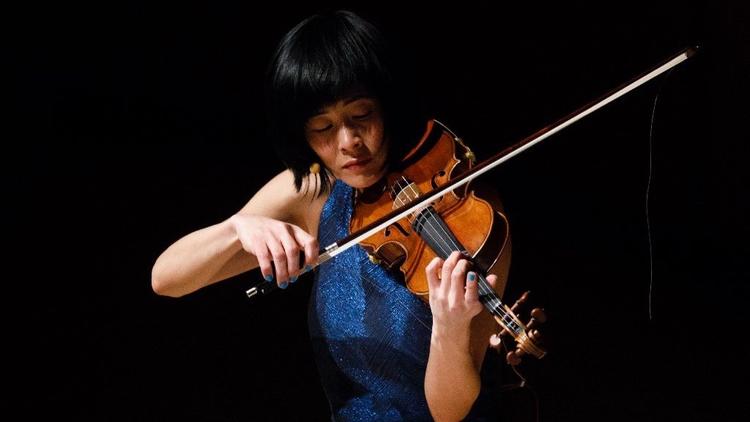Chicago Tribune
By John von Rhein
January 29, 2018
original
link
Review: Glen Ellyn's Jennifer Koh premieres modern takes on Paganini

Violinist Jennifer Koh tackled several ambitious contemporary projects during the Winter Chamber Music Festival at Northwestern on Sunday Jan. 28, 2018. (Armando L. Sanchez / Chicago Tribune)
Other star violinists play concerts largely devoted to music by dead, white European composers. Jennifer Koh tackles ambitious contemporary projects designed to connect performers, audiences and living composers in mutually beneficial ways. In so doing, the Glen Ellyn-born virtuosa is adding substantially to the violin repertory: To date, she has given the premieres of more than 60 works written expressly for her.
“Shared Madness,” the two-part program Koh presented Sunday at Northwestern University’s Pick-Staiger Concert Hall to conclude the 22nd annual Bienen School of Music Winter Chamber Music Festival, marks another in a series of collaborative ventures involving her and what she calls “my community of composers.”
As her contribution to the New York Philharmonic’s NY Phil Biennial in 2016, Koh commissioned 31 short pieces for solo violin from as many composers. The composers were to explore, in their own voices, the idea of virtuosity as represented by Niccolo Paganini’s famous set of 24 unaccompanied violin caprices. On Sunday she divided the commissions into two groups, presenting 14 of them in her afternoon recital, the remaining 17 in the evening.
I caught the first program and came away admiring the formidable technical prowess, probing musicality and dedication Koh brought to this unusual undertaking more than some of the pieces themselves. There were, to be sure, several appealing discoveries but others that suggested that merely updating Paganini isn’t enough when the composer has little to say musically beyond refracting old formulas through a 21st century prism.
That was probably inevitable and, in any case, does not invalidate the artistic validity of Koh’s initiative.
The composers who contributed to her round-robin project could be divided into three groups — established figures such as Augusta Read Thomas, Kaija Saariaho, Philip Glass and John Harbison; rising younger talents such as Andrew Norman, Matthew Aucoin, Zosha Di Castri, Daniel Bjarnason and Sean Shepherd; and genre-crossing figures such as Vijay Iyer, Bryce Dessner and Gabriel Kahane.
Several pieces suggested that some of today’s classical composers believe virtuosity has become irrelevant, if not meaningless, at a time when glossy studio recordings have made technical perfection commonplace. For example, Chicago Symphony Orchestra resident composer Samuel Adams’ “for jenny,” bare wisps of sound couched in quiet electronic murmurs, turned the Paganini aesthetic on its ear.
The majority of composers found ways, some ear-catching, to reimagine Paganini’s technical challenges — flurries of double and triple stops, bow crossings, left-hand pizzicatos, fingered tremolos and the like — with a contemporary sensibility. Several would work well as novelties at the end of more conventional recital programs.
Di Castri’s “Patina,” with its wild, arpeggiated figures skittering to the top of the fingerboard, is one such piece that holds your attention, as does Missy Mazzoli’s “Kinski Paganini,” which mashes together echoes of Paganini’s famous Caprice No. 24 with allusions to actor Klaus Kinski’s final film (1989).
Koh went from one piece to the other with scarcely time to draw breath, leaving the listener to guess the authorship of a number of pieces in what appeared to be a hastily revised program.
But there was no mistaking the composer of “The Single Art Form Is Dead” as anybody but the fiercely idiosyncratic Kahane, even if Koh did not mention his name in her recitation of the long apologia he insisted she read before playing the music. Most of the 20 minutes was devoted to her delivering a rambling, nearly incoherent account of an encounter Kahane had with an audience member who may or may not have been Chicago actor John Malkovich — or something to that effect.
It gets better. Koh had the option of playing or not playing the attached music. Unfortunately, she did play it. All that prefatory self-indulgence just to hear a banal little piece of fake cabaret music? Was all of this meant to embarrass the performer? If so, Koh didn’t fall for the bait; she wore her gamest poker face throughout. An audience forced to sit through this unspeakably tedious piece of performance art wasn’t so lucky.
Copyright © Chicago Tribune
© Jennifer Koh, All Rights Reserved. Photography by Juergen Frank. Site by ycArt design studio